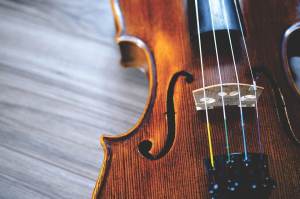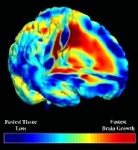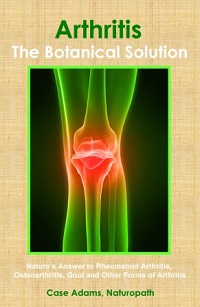Music Improves Learning, Cognitive Development

Music helps us learn and helps our brain develop, increasing our cognitive skills, studies show.
Music helps our brain develop, speeds cognitive development and brain health, and helps speed up learning, according to several studies.
In this article
A musical history
Music has been part of human society since ancient times. Music has played a major role in our spiritual activities, our social lives and our personal lives. Music has also been used to communicate cultural and political issues. It has provided a vehicle for expressing love and care for others, as well as a vehicle to express our devotion to the Supreme.
As these uses of music have developed, we find ourselves drenched in music as we go about our lives. Music pervades just about every store, every elevator, every car and form of public transportation. This is besides the plethora of smartphone stations playing just about any form of digital music we could imagine.
Yes, we live in a musical age. Our ancestors had to work hard to surround themselves with music by physically playing the piano or other instrument. But we can access music simply with a click of a button.
Still there are many who avoid music in their lives. Are they better off with silence? Or does music help us concentrate, help us learn and help our brains develop?
The answer, according to scientific research, is yes. Let’s take a look at some of the interesting research.
Music helps childhood cognition
A 2018 study from the University of Helinski tested 66 children over a two-year period. The children were aged from five to six years old. They were tested twice each year for linguistic skills, perception abilities and inhibitory control.
The researchers compared children who attended music playschool classes with those who did not. The researchers found that the children who attended the music playschool classes saw faster development in language skills compared to the other children.
In a 2018 study from the University of Toronto, scientists tested 84 teenage students. They first gave them musical testing to gauge their musical competence. They also tested their short-term memory, their general cognitive abilities, and their openness to new ideas.
The researchers found that those students who had greater musical competence also had greater short-term memory, better cognitive abilities and greater openness compared to those students with less musical competence.
Children musicians have better brain health
Clinical research has confirmed other research that a child’s brain grows faster when learning music early on in life. In a 2012 study from the Montreal Neurological Institute and Hospital, doctors tested 36 musicians, half of whom learned to play music before the age of seven and some who learned to play music after the age of seven. They found that those who had learned before the age of seven had larger areas of white matter in the corpus callosum – an area of the brain that connects the right and left motor cortices.
Those who started playing music before the age of seven had greater connections within the nerve fibers of this region.
Those musicians who began training later showed no difference in their brains than those who were not musicians.
Dr. Robert Zatorre, who is also a director at the International Laboratory for Brain Music and Sound Research, led the study. “This study is significant in showing that training is more effective at early ages because certain aspects of brain anatomy are more sensitive to changes at those time points,” Dr. Zatorre said.
Music lessons are probably the most applicable experience in this study. Those children who take music lessons – should those lessons begin at least by the age of 8 years old – should gain the benefit. This, however, doesn’t mean that learning a musical instrument early on without formal training would not also benefit the child.
The researchers found that those who had received training early in life also increased the person’s motor skills and timing – even skills unrelated to music.
Playing a musical instrument changes the brain
In another study, this one from Northwestern University, found that playing a musical instrument produces changes in the brain. The researchers found that those adults who received formal musical training during childhood had significantly greater brainstem responses to sound, and the level of their increased response related directly to the amount of musical training the child had.
This greater brainstem response is linked with greater brain efficiency during problem solving and learning speeds.
The evidence from this study points to the fact that this improvement among the brain carries on through adulthood, even if musical training is not continued.
Listening to fast paced music speeds learning
Scientists from Australia’s Monash University tested 73 university students. The researchers separated the students into three groups. One group heard no music during the testing. Another group was tested with low tempo music. And another group was tested with fast tempo music. The music groups listened to music with wireless headphones during the testing.
The testing consisted of an interactive computer program that combined reaction times with learning response. The students had to learn things and submit answers and responses while being timed. The testing measured response timing, but also executive brain function and speed of learning.
The researchers found that those who listened to music had better response times and learning speeds than those who did not listen to music. But the researchers also learned that the faster-paced music (fast tempo) produced better learning and reaction times than the slower paced music. The fast paced music stimulated the prefrontal cortex and encouraged improved executive function.
Music throughout life is also considered to have substantial benefits. Some have compared its effects on the brain to aerobic exercise. Lowered stress levels have been found among several studies. Music has also shown to be helpful for dementia situations such as Alzheimer’s disease:
REFERENCES:
Linnavalli T, Putkinen V, Lipsanen J, Huotilainen M, Tervaniemi M. Music playschool enhances children’s linguistic skills. Sci Rep. 2018 Jun 8;8(1):8767. doi: 10.1038/s41598-018-27126-5.
Swaminathan S, Schellenberg EG. Musical Competence is Predicted by Music Training, Cognitive Abilities, and Personality. Sci Rep. 2018 Jun 15;8(1):9223. doi: 10.1038/s41598-018-27571-2.
Mansouri FA, Acevedo N, Illipparampil R, Fehring DJ, Fitzgerald PB, Jaberzadeh S. Interactive effects of music and prefrontal cortex stimulation in modulating response inhibition. Sci Rep. 2017 Dec 22;7(1):18096. doi: 10.1038/s41598-017-18119-x.
Kar A. Early music lessons boost brain development. Neuro. Feb 2012.
Skoe E, Kraus N. A little goes a long way: how the adult brain is shaped by musical training in childhood. J Neurosci. 2012 Aug 22;32(34):11507-10.



















